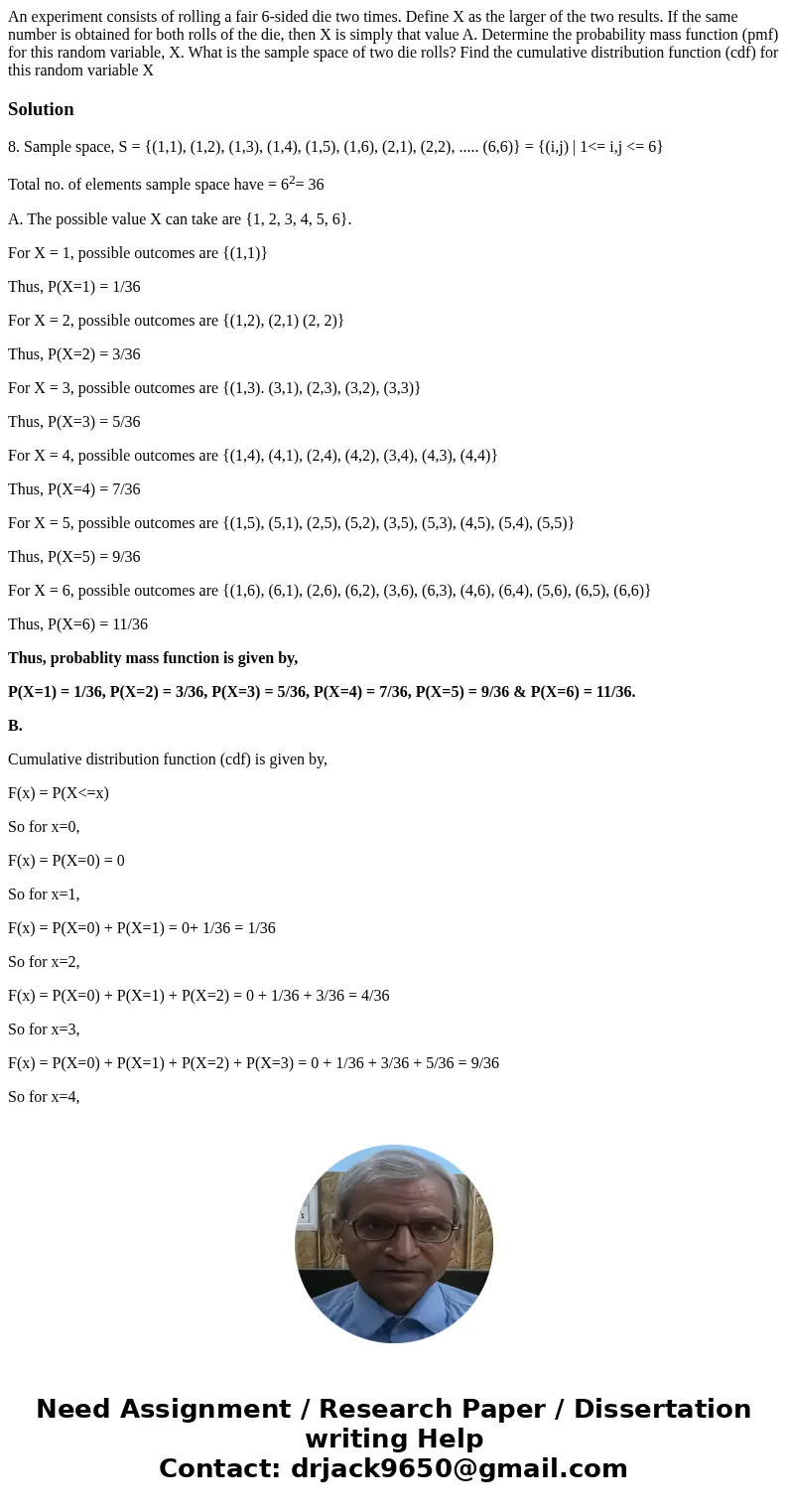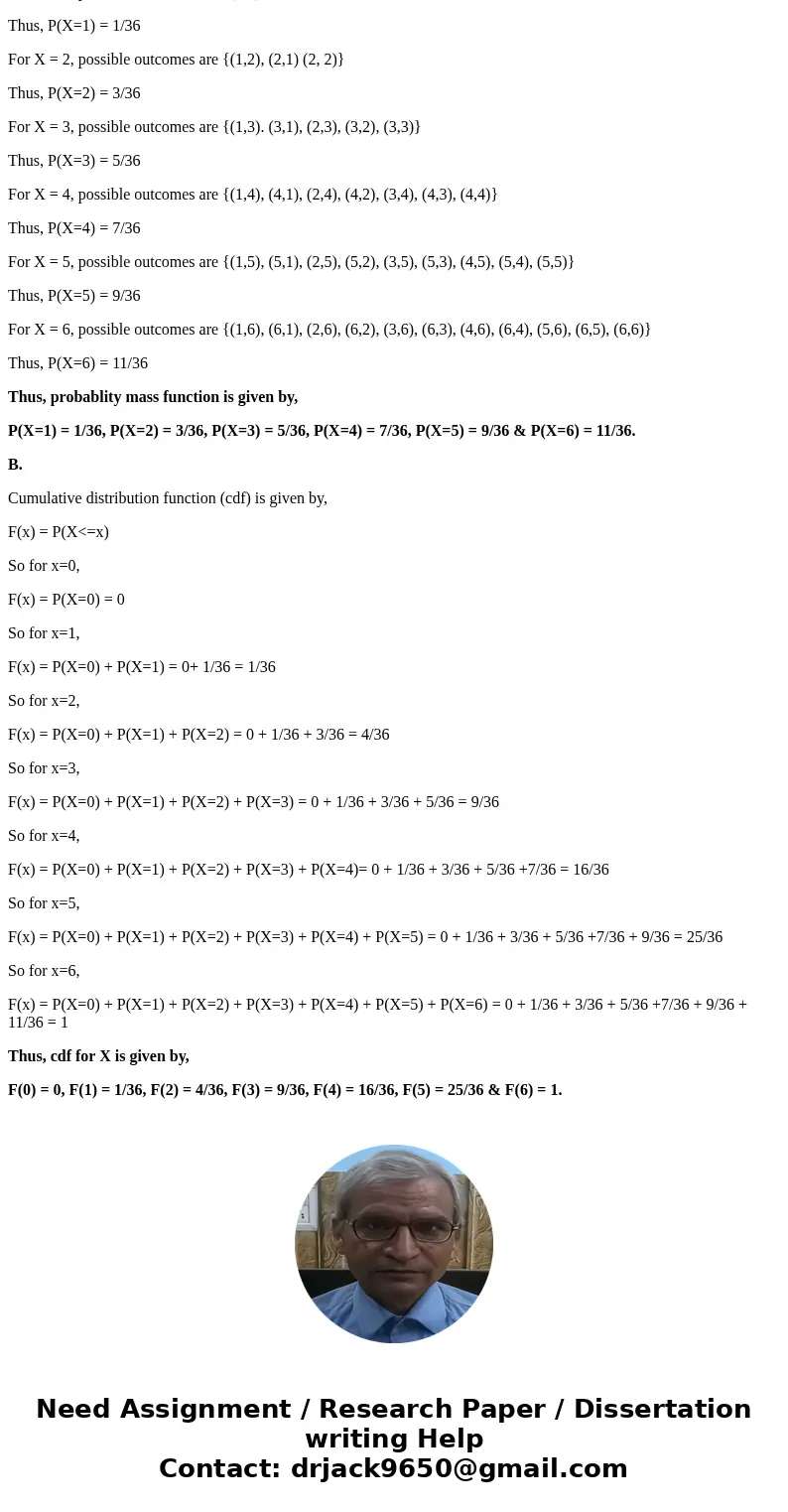An experiment consists of rolling a fair 6sided die two time
Solution
8. Sample space, S = {(1,1), (1,2), (1,3), (1,4), (1,5), (1,6), (2,1), (2,2), ..... (6,6)} = {(i,j) | 1<= i,j <= 6}
Total no. of elements sample space have = 62= 36
A. The possible value X can take are {1, 2, 3, 4, 5, 6}.
For X = 1, possible outcomes are {(1,1)}
Thus, P(X=1) = 1/36
For X = 2, possible outcomes are {(1,2), (2,1) (2, 2)}
Thus, P(X=2) = 3/36
For X = 3, possible outcomes are {(1,3). (3,1), (2,3), (3,2), (3,3)}
Thus, P(X=3) = 5/36
For X = 4, possible outcomes are {(1,4), (4,1), (2,4), (4,2), (3,4), (4,3), (4,4)}
Thus, P(X=4) = 7/36
For X = 5, possible outcomes are {(1,5), (5,1), (2,5), (5,2), (3,5), (5,3), (4,5), (5,4), (5,5)}
Thus, P(X=5) = 9/36
For X = 6, possible outcomes are {(1,6), (6,1), (2,6), (6,2), (3,6), (6,3), (4,6), (6,4), (5,6), (6,5), (6,6)}
Thus, P(X=6) = 11/36
Thus, probablity mass function is given by,
P(X=1) = 1/36, P(X=2) = 3/36, P(X=3) = 5/36, P(X=4) = 7/36, P(X=5) = 9/36 & P(X=6) = 11/36.
B.
Cumulative distribution function (cdf) is given by,
F(x) = P(X<=x)
So for x=0,
F(x) = P(X=0) = 0
So for x=1,
F(x) = P(X=0) + P(X=1) = 0+ 1/36 = 1/36
So for x=2,
F(x) = P(X=0) + P(X=1) + P(X=2) = 0 + 1/36 + 3/36 = 4/36
So for x=3,
F(x) = P(X=0) + P(X=1) + P(X=2) + P(X=3) = 0 + 1/36 + 3/36 + 5/36 = 9/36
So for x=4,
F(x) = P(X=0) + P(X=1) + P(X=2) + P(X=3) + P(X=4)= 0 + 1/36 + 3/36 + 5/36 +7/36 = 16/36
So for x=5,
F(x) = P(X=0) + P(X=1) + P(X=2) + P(X=3) + P(X=4) + P(X=5) = 0 + 1/36 + 3/36 + 5/36 +7/36 + 9/36 = 25/36
So for x=6,
F(x) = P(X=0) + P(X=1) + P(X=2) + P(X=3) + P(X=4) + P(X=5) + P(X=6) = 0 + 1/36 + 3/36 + 5/36 +7/36 + 9/36 + 11/36 = 1
Thus, cdf for X is given by,
F(0) = 0, F(1) = 1/36, F(2) = 4/36, F(3) = 9/36, F(4) = 16/36, F(5) = 25/36 & F(6) = 1.


 Homework Sourse
Homework Sourse